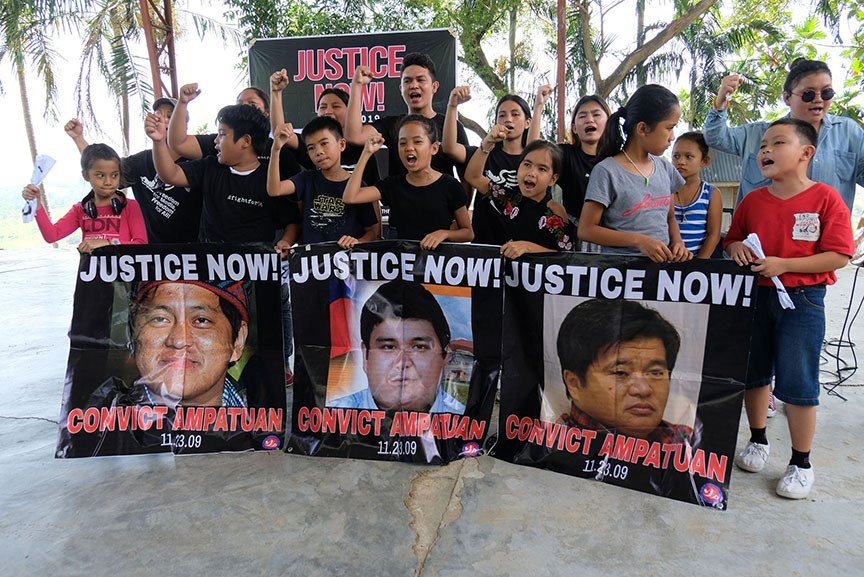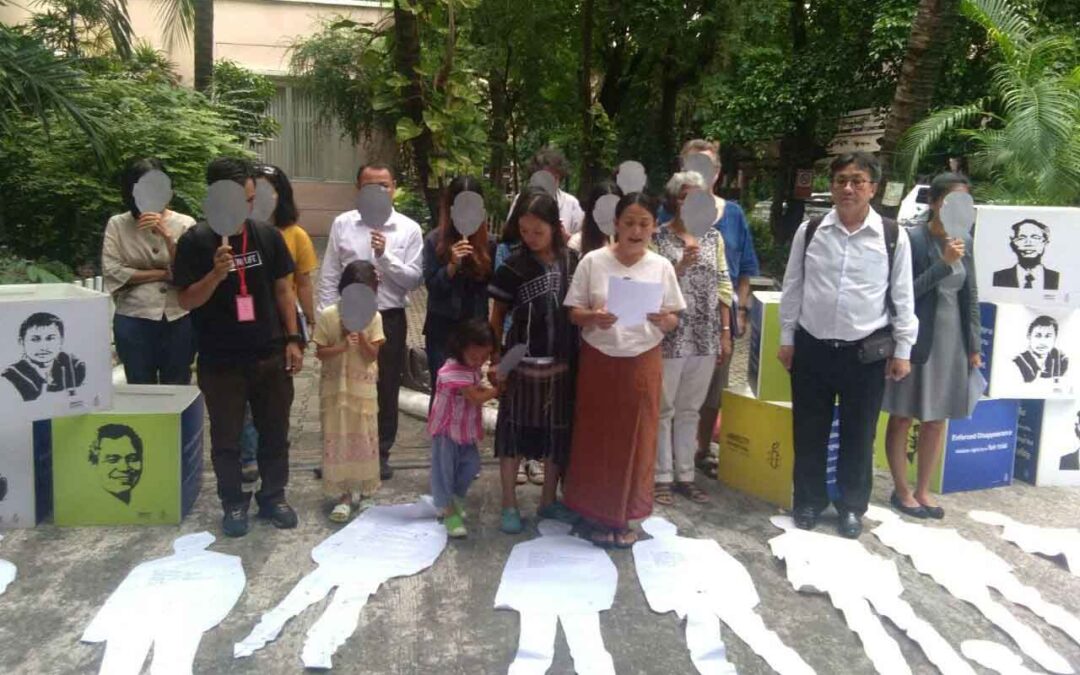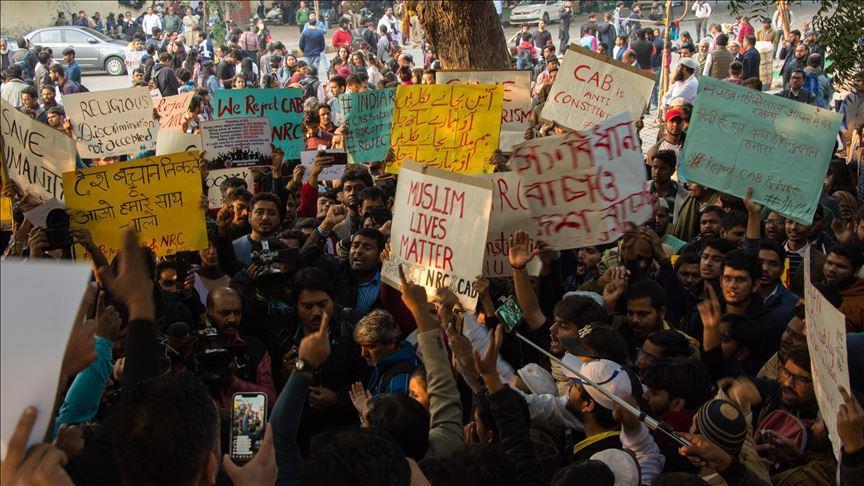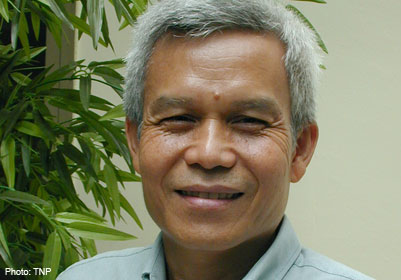
Dec 19, 2019 | News
The ICJ said that today’s verdict by the Quezon City Regional Trial Court on the “Ampatuan Massacre” is a first step in achieving justice for the victims and their families.
The court found guilty several of the principal accused, including Zaldy Ampatuan, who is a former governor of the Autonomous Region in Muslim Mindanao. The Ampatuan Massacre involved the killing of 58 people, including 32 journalists. It became known as the single deadliest attack against journalists globally.
“The Ampatuan massacre was a human rights tragedy that demonstrated how ingrained impunity has become in Philippine society,” said Emerlynne Gil, ICJ’s Senior International Legal Adviser.
She added, “It clearly illustrated how respect for human rights has become a mockery in the Philippines, that it can be casually thwarted by a group of individuals who thought they can get away with the killing of 58 people, including journalists, in broad daylight.”
There are 197 accused named in this case, many of them members of the politically-powerful Ampatuan family. The principal accused, including Zaldy Ampatuan and several of his family members, were sentenced to imprisonment of reclusion perpetua (30 to 40 years) without parole. They were also ordered by the court to compensate the victims of the massacre.
The ICJ urged the Philippine government to use this case to now effectively address the culture of impunity in the country.
“The Philippine government should look to this case and use it more generally as a force for a comprehensive drive against impunity, which has been pervasive in unlawful killings, whether by State or private actors,” said Emerlynne Gil.
Background
On 23 November 2009, Bai Genalyn Mangudadatu, wife of Esmael Mangudadatu, was accompanied by members of her family, lawyers, political supporters, and journalists to file the certificate of candidacy of her husband, Esmael Mangudadatu, for the upcoming elections. They were killed by men who later on were revealed to have been ordered by Andal Ampatuan Sr., Andal Ampatuan Jr., and several other members of the Ampatuan family. The Ampatuan family is the political rival of the Mangudadatus.
The convoy of vehicles accompanying the Mangudadatus was ambushed. Passers-by were also killed by the armed men. Their bodies and vehicles were buried in shallow graves nearby.
There were 58 people killed that day, including 32 journalists who were accompanying the Mangudadatus. This became known as the single deadliest attack against journalists globally.
There were 192 persons named as accused in this case, including members of the Ampatuan family and law enforcement officers who conspired with them.
The trial went on for ten years. On 19 November 2019, Branch 221 of the Regional Trial Court of Quezon City rendered its decision finding guilty beyond reasonable doubt 28 people, including Zaldy Ampatuan, his brother Datu Andal Ampatuan Jr, and several other Ampatuan family members. They were sentenced to reclusion perpetua (30 to 40 years) without parole.
Contact
Emerlynne Gil, Senior International Legal Advisor, International Commission of Jurists, t: +66 8409 235 75, e: emerlynne.gil(a)icj.org

Dec 18, 2019 | Advocacy, News
On 17 December 2019, the ICJ co-hosted a discussion on extrajudicial killings in Thailand and the lack of progress in investigations of these killings, with an emphasis on the killings of ethnic, racial, or linguistic minorities or indigenous persons, including indigenous persons in Northern Thailand and ethnic Malays in Southern Thailand.
The discussion was held at the Faculty of Law of Chiang Mai University. The event bought together participants from the North and Deep South of Thailand who considered developing joint advocacy strategy to address the troubling practices.
The event commenced with panel discussions on extrajudicial killings in Thailand and obstacles in access to justice faced by minority communities. Panelists included family members of victims, civil society organizations, lawyers and academics. Affected persons shared their experience as victims of attempted extrajudicial killings or relatives of victims of extrajudicial killings. Other panelists shared information on the dire trend of killings in their regions; concerns regarding extra-judicial killings of unarmed suspects; barriers to access to justice, including financial barriers due to poverty, lack of legal information, lack of trust in the authorities, and language barriers for indigenous speakers. Several panelists expressed concerns that family members of the victims could not participate in the investigation process. Others spoke on the objection of authorities to carry out autopsies of suspected extrajudicial killings in the Deep South.
ICJ’s Legal Adviser Sanhawan Srisod highlighted that investigators and law enforcement officials need to take into account international law and standards. These include the revised Minnesota Protocol on the Investigation of Potentially Unlawful Death (2016), which was launched in Thailand on 25 May 2017; and the 1990 UN Basic Principles on the Use of Force and Firearms by Law Enforcement Officials. Different standards of operation between the police and the military to make arrests, which make military officers prone to violate the UN Basic Principles on the Use of Force and Firearms by Law Enforcement Officials. She also spoke on the different types of firearms that security personnel use and how they affect the proportionality of force; and the lack of guidelines on the use of firearms in arrest operations that is in compliance with international laws and standards.
A theater performance by Lanyim Theatre took place after the discussion.
The first panel was moderated by Pranom Somwong, Thailand’s Representative for Protection International. The panel included affected persons of an alleged extra-judicial killing from Thailand’s Deep South; Maitree Chamroensuksakul, from Rak Lahu Group and relative of a victim of an alleged extra-judicial killing in Northern Thailand; Prof. Somchai Preechasinlapakun, Head of Law Research and Development Center, Chiang Mai University; and Yureesa Samah, Officer of Duay Jai Foundation.
The second panel was moderated by Nadthasiri Bergman, Director of Human Rights Lawyers’ Association. The panel included Preeda Nakpiew, Lawyer of Cross-Cultural Foundation; Anukul Awaeputeh, Lawyer and Head of the Pattani branch, Muslim Attorney Center Foundation; Sumitchai Hattasarn, Lawyer and Director of Centre for the Protection and Revival of Local Community Rights; and Sanhawan Srisod, Legal Adviser of the ICJ.
The event was conducted in collaboration with Amnesty International Thailand; Cross Cultural Foundation; Human Rights Lawyers’ Association; Inter Mountain Peoples’ Education and Culture in Thailand Association (IMPECT); Legal Research and Development Center, Chiang Mai University; Office of the High Commissioner for Human Rights (OHCHR) Regional Office for South-East Asia; and Protection International.
Further reading
Thailand: ICJ co-hosts discussion on addressing extrajudicial killings
ICJ holds seminar at Chiang Mai University Thailand on the right to life and the duty to investigate

Dec 16, 2019 | News
The Indian Police Service and the paramilitary Central Reserve Police Force must desist from the use of unlawful force and ill-treatment against demonstrators protesting the Citizenship (Amendment) Act, the ICJ said today.
The Indian authorities must also hold police and other public officials accountable for the human rights violations arising from these police actions, the ICJ added.
“The violent tactics that police have used over the past several days in Delhi, Uttar Pradesh, and other Indian states must cease and the government must address the legitimate concerns raised by the public about the discriminatory impacts of both the Citizenship Amendment Act and National Register of Indian Citizenship,” said Frederick Rawski, ICJ Asia Pacific Director.
“Any officials who use excessive force, including the unlawful or disproportionate use of pellet guns or tear gas cannons against unarmed student protestors, must be fully and impartially investigated and held accountable for their actions,” he added.
In its operations policing the demonstrations, the ICJ called on the authorities to abide by Indian Constitutional guarantees and international legal obligations on human rights.
These protect persons from torture and ill-treatment and the rights to freedom of expression, association and assembly.
They also require that police refrain from using unnecessary and disproportionate force and never use potentially lethal force unless to protect against an imminent threat to life.
The ICJ also called on the authorities to ensure that any person detained not be subjected to torture or other ill-treatment; have prompt and confidential access to counsel; and that those injured or otherwise provided with access to medical services.
“The police need to respond to prevent acts of violence, but they must use force only when strictly necessary. Potentially lethal force is only justifiably employed in self-defence or in defence of others against an imminent threat of death or serious injury,” said Rawski.
“If arrests need to be made, they must be done without exception in accordance with the law, respecting the rights of detainees to have access to legal counsel, to be free of torture and other ill-treatment of any kind, and to receive needed medical treatment,” he added.
The ICJ said that the authorities must undertake prompt, independent, impartial and thorough investigation of all allegations of unlawful use of force, with a view to holding accountable any responsible authorities and providing an effective remedy and reparation to victims.
Background
In response to the passage of the Citizenship (Amendment) Act, 2019, protests erupted all over the country, including in Assam, Tripura, Meghalaya, Arunachal Pradesh, Delhi, West Bengal, Kerala, and Hyderabad.
In Delhi and Uttar Pradesh, yesterday, members of the police and Central Reserve Police Force forced their way onto the campuses of Jamia Milia University and the Aligarh Muslim University in response to protests against the Citizenship (Amendment) Act, 2019.
At Jamia Milia University, the police and Central Reserve Police Force used tear gas cannons upon students who had been reportedly protesting peacefully. Police entered the university library and beat students who were there studying for their exams. The police detained (and subsequently released) some 50 students. Some reported being beaten while in detention, held for over six hours in a locked police station, and denied access to lawyers and family. Medical attention was also reportedly denied to some injured students.
At Aligarh Muslim University, the police and Central Reserve Police Force reportedly demolished the gates, and used tear gas, pellet guns, and lathi (wooden sticks) charge. They were said to have entered student hostels, wherein they reportedly caused damage to one room which had students inside it. According to a lawyer at the University, at least one’s student whereabouts is unknown and some 50 students and others have reported been injured, some severely. Some were reportedly taken to the hospital by the police.
The Citizenship (amendment) Act, 2019 amends the Citizenship Act, 1955, which governs questions of citizenship and aspects of lawfulness of migration status in India. The Act gives protected status to Hindu, Sikh, Jain, Parsi, Buddhist and Christian migrants from Pakistan, Afghanistan and Bangladesh, all Muslim-majority countries, who entered India on or before 31 December 2014. Similarly situated Muslims are categorized as “illegal migrants”.
The Bill provides to the above-mentioned religious communities and countries an expedited route of citizenship giving them the opportunity to be eligible for citizenship by naturalization if they have lived or worked in India for six years, as opposed to twelve years, as otherwise required. The Bill controversially excludes from its ambit certain ethnic and religious groups, such as Muslims, in violation of international law and standards protecting against discrimination.
To download the full statement with additional background information, click here.
Contact
Maitreyi Gupta, ICJ India Legal Adviser, t: +91 77 560 28369 e: maitreyi.gupta(a)icj.org
Frederick Rawski, ICJ Asia-Pacific Director, t: +66 64 478 1121; e: frederick.rawski(a)icj.org

Dec 15, 2019 | Advocacy, Non-legal submissions
The ICJ has urged the UN Special Rapporteur on Independence of Judges and Lawyers to ensure that his upcoming report on challenges to the independence of prosecutors, fully addresses abuse of prosecution powers to target human rights defenders, political opponents or others, or giving rise to a more general and systemic lack of fair trial for accused persons, or entrenching impunity of State perpetrators of human rights violations, as among the dominant contemporary challenges to prosecutorial independence globally from a human rights perspective.
The Special Rapporteur has made clear his intention to address challenges to prosecutorial independence arising from transnational corruption and organized crime. While the ICJ certainly agrees that such interference can and does have impacts on human rights, to varying extents around the world, the ICJ submission also highlights and documents that threats to prosecutorial independence emanating from the prosecutor’s own Executive government should be seen to be of at least equal concern from a human rights perspective, globally, and should be fully addressed in any report on “contemporary challenges of prosecutorial independence” from a human rights perspective.
The ICJ’s submission can be downloaded in PDF format here: UN-Advocacy-SRIJLProsecutors-2019

Dec 15, 2019 | News
On 15 December 2019, the ICJ joined 87 organizations and 11 individuals in a statement urging the Lao and Thai governments to investigate apparent cases of enforced disappearance and demanding that the Lao government finally reveal Sombath Somphone’s whereabouts and ensure justice for him and his family.
The statement was issued on the seventh anniversary of the disappearance of Lao civil society leader Sombath Somphone and called particularly for the establishment of an independent and impartial investigative body tasked with determining Sombath’s fate and whereabouts without delay, considering the Lao police’s protracted failure to effectively investigate his case. The new body should have the authority to seek and receive international technical assistance in order to conduct a professional, independent, impartial, and effective investigation in accordance with international standards.
Sombath Somphone was last seen at a police checkpoint on a busy street in Vientiane on the evening of 15 December 2012. Footage from a CCTV camera showed that Sombath’s vehicle was stopped at the police checkpoint and that, within minutes, unknown individuals forced him into another vehicle and drove him away in the presence of police officers. CCTV footage also showed an unknown individual driving Sombath’s vehicle away from the city center. The presence of police officers at Sombath’s abduction and their failure to intervene strongly indicates state agents’ participation in Sombath’s disappearance.
Lao authorities have repeatedly claimed they have been investigating Sombath’s enforced disappearance but have failed to disclose any new findings to the public since 8 June 2013. They have met with Sombath’s wife, Ng Shui Meng, only twice since January 2013 – the last time in December 2017. No substantive information about the investigation has been shared by the police with the family, indicating that, for all intents and purposes, the police investigation has been de facto suspended.
The joint statement called on both Lao and Thai governments to promptly and impartial investigate all cases of suspected enforced disappearance in Laos and Thailand in line with international legal standards with a view towards determining the fate and whereabouts of apparent victims.
These include the cases of Od Sayavong, a Lao refugee living in Thailand who has been missing since 26 August 2019, and the cases of Ittiphon Sukpaen, Wuthipong Kachathamakul, Surachai Danwattananusorn, Chatcharn Buppawan and Kraidej Luelert, five Thai critics of the monarchy and the Thai government living in exile in Laos, who went missing between June 2016 and December 2018.
The statement further urged the Lao and Thai governments to promptly ratify the International Convention for the Protection of All Persons from Enforced Disappearance, which Laos and Thailand signed in September 2008 and January 2012 respectively; to incorporate the Convention’s provisions into their domestic legal frameworks, implementing it in practice; and to recognize the competence of the Committee on Enforced Disappearances to receive and consider communications from or on behalf of victims or other States parties.
The full statement is available here.
Contact
Frederick Rawski, ICJ Asia and the Pacific Director, e: frederick.rawski(a)icj.org









